HIT CHANNEL EXCLUSIVE INTERVIEW: July 2020. We had the great honour to talk with a legendary musician: Bill Nelson. He is best known as the founding member, lead guitarist and vocalist of the art rock pioneers, Be-Bop Deluxe. After one album with Red Noise, he pursued a successful solo career. Earlier this year (2020), he released his latest solo effort, “The Jewel”. On 17 July, Esoteric Recordings released a 4 Disc Limited Edition Boxed Set of “Axe Victim”, the 1974 debut album by Be-Bop Deluxe. Read below the very interesting things he told us:
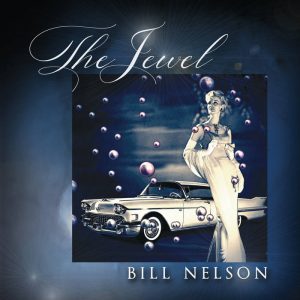 Would you like to give us some info about your new solo album, “The Jewel”?
Would you like to give us some info about your new solo album, “The Jewel”?
“The Jewel”, though only recently released, was actually recorded in 2016. It’s just one of maybe a dozen albums that I’ve recorded but not found time to manufacture and release. I record almost continuously in my home studio and have a vast archive of material to choose from. The manufacturing and release process has always been frustrating for me. The system, no matter how well-intentioned, is frustratingly slow compared with my productivity rate, so backlogs soon build up. But regarding “The Jewel”: It’s an instrumental album, sometimes dreamily ambient, sometimes jazzy, filled with gleaming guitars and is, if I may be permitted to say so, quietly beautiful.
“Axe Victim” (1974) is the latest Be-Bop Deluxe re-release from Esoteric Recordings. Are you satisfied with its final result?
Esoteric have done a fine job of re-issuing the Be Bop Deluxe albums, especially in terms of the luxury box sets with remix versions, DVD footage and lavish accompanying book and posters, etc… But, I have to be honest and admit that I very rarely listen to Be Bop Deluxe these days. The album was originally released 44 years ago and some of the songs were written even earlier. It feels like another world, another time, almost another person. It’s like looking back at old childhood photographs, you know they’re of you, but it’s hard to identify your current self in them. Time is a fickle mistress. Also of course, I’ve recorded well over a hundred albums since that time so it’s not as if Be Bop Deluxe is the only music I’ve ever made, it’s only a fraction of my creative output, though perhaps the most commercially well known. But I’m more interested in the road ahead. My instinct has always been to look through the windscreen rather than the rear view mirror. What’s ahead appeals to me more than what’s behind.
Do you think the recent re-releases is a good opportunity for younger people to learn about the music of Be-Bop Deluxe?
Well, I guess there may be some interest, amongst younger people, in the music of the 1970s, as a curiosity you might say. I enjoy listening to music of the 1940s and ‘50s, no generation is entirely immune to nostalgia and the romance of times past. Which is fine and I hope that discovering Be Bop Deluxe might spark a younger person’s curiosity to investigate the way my music has developed over all these years and perhaps eventually lead them to the music I’m making now.
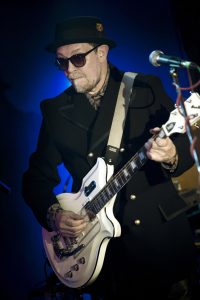 Why was there a line-up change after the “Axe Victim” (1974) tour?
Why was there a line-up change after the “Axe Victim” (1974) tour?
I think the story has been documented fairly often but, basically, the first line up was put together with friends from Wakefield in Yorkshire. We had no big plans to become professional musicians, we all had day jobs and playing in bands was just a hobby, a bit of fun. But previous to Be Bop Deluxe I’d released a solo album on my own independent label and that was heard by EMI Records who approached me with a solo recording deal in mind. By that time, I’d just formed Be Bop Deluxe and told EMI that this was where I was now at. They came to see the band but didn’t think the other musicians were good enough. However, they still offered me a solo deal. I refused and, after more visits to check the band out, they finally agreed to sign it, hence the “Axe Victim” album. But they kept saying that I needed stronger musicians around me, and I eventually came around to seeing their point, so I abandoned the first line-up and set out in search of other musicians. It wasn’t an easy decision because the original band members were all personal friends of mine. It was a tough call but I realised it had to be done.
Why weren’t you satisfied with Roy Thomas Baker’s (Queen producer) production on “Futurama” (1975) album?
It wasn’t the production or sound of “Futurama” that bothered me, far from it, I think it’s a great sounding record. The problem was one of personality clashes with producer Roy Thomas Baker. I guess we were different kinds of people. A lot of what made “Futurama” sound so good was actually the work of Pat Moran, the engineer at Rockfield Studios, who recorded most of the tracks on the album. He was one of the great engineers in the UK at that time and was vital to the sound of the record. I had a great deal of respect for him.
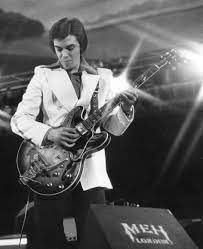 Joe Bonamassa is a huge fan of “Sister Seagull” from “Futurama” (1975). Would you like to tell us a few words about this beautiful song?
Joe Bonamassa is a huge fan of “Sister Seagull” from “Futurama” (1975). Would you like to tell us a few words about this beautiful song?
“Sister Seagull” was inspired by a dream my ex-wife had. In the dream she imagined herself as a nun who magically transformed into a seagull. I thought that might make the starting point for a song and “Sister Seagull” was the result. It was flattering to read that Joe likes the song, but in terms of guitar, I think “Crying To The Sky” has the edge on it.
What was it like to record “Sunburst Finish” (1976) at Abbey Road? You even used in “Sleep That Burns” the same mellotron The Beatles used in “Strawberry Fields Forever”!
I’d been at Abbey Road briefly on one of the “Axe Victim” mixing sessions. Of course, the studio was legendary, even back in the ‘70s. It was a privilege to record there, and very comfortable and productive. And yes, there were all kinds of things that had been connected with the Beatles, including a Marimba that they’d used, and which I used on a couple of tracks, including the song ‘Japan.’ I eventually bought the Marimba when the studio had a clear out. I still have it here at home, a piece of Beatles history, I guess.
What was the contribution of John Leckie to the sound of Be-Bop Deluxe albums?
John and I co-produced all the Be Bop Deluxe albums from “Sunburst Finish” on. It was John’s, (and my) first attempt at producing. We became a great team. John was so easy to get along with, especially after my not so happy experience with the “Futurama” sessions. We taught each other how to produce. John had been an engineer at Abbey Road but had never produced anyone before. I had lots of ideas and concepts to do with arrangements and so on, but very little experience of engineering, so the two of us exchanged ideas and knowledge and became a very strong production team. I’m still in touch with John, he’s a very dear friend.
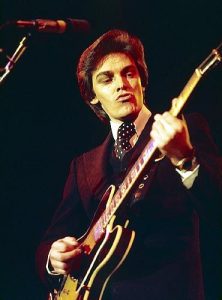 Were you surprised when you met Paul McCartney in the parking lot at Abbey Road?
Were you surprised when you met Paul McCartney in the parking lot at Abbey Road?
Well, yes, it was a very nice surprise! And Paul was extremely complimentary about the band. He’d apparently been listening outside our studio door and said that it sounded great. Which was a fine compliment from a fine musician.
How spontaneous was the less guitar-oriented sound of “Modern Music” (1976) album by Be-Bop Deluxe?
I always made home demos of the songs for the band to learn, prior to going into the studio proper. Most of the arrangements were worked out before the band recorded the songs in the studio, so “Modern Music” was no different to that. There were always carefully conceived structures worked out prior to recording. On the more guitar oriented albums, of course, the majority of the solos were purely improvised, though the foundations that supported them were carefully pre-arranged. I’m not sure whether “Modern Music” was really any different in that respect, but certainly, things like “The Modern Music Suite”, which was quite ambitious in its scope, had to be very rigidly structured out due to its complexity and length.
Do you have happy memories of the Be-Bop Deluxe performances on The Old Grey Whistle Test in 1975 and 1976?
I was always incredibly nervous on those TV shows, (and still am if anyone points a camera at me). I’ve never been what you might call a “natural” performer, I always preferred the studio to the stage. I guess you could say I’m more of a solitary painter than a public actor. But I’m glad we did those TV appearances as they now provide a record of the times, a small slice of history.
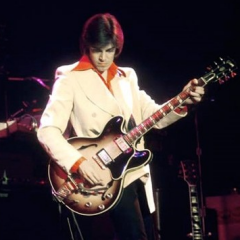 Is it flattering that you influenced Randy Rhoads? He was very impressed by your lead on “Ships In the Night”.
Is it flattering that you influenced Randy Rhoads? He was very impressed by your lead on “Ships In the Night”.
I’m flattered and amazed that my work seems to have inspired or influenced quite a few musicians. I’m blown away by that. The approval of my peers means a lot to me and I’m grateful.
What is the meaning of the pentagram in the cover of “Live! In The Air Age” (1977)?
The image on the cover comes from Fritz Lang’s “Metropolis” movie. But the Pentagram has occult significance in the Western Magical tradition. It symbolises the four esoteric elements, earth, air, water and fire, plus the fifth element which is spirit.
How important was John Peel in your career?
Enormously important. John played my independently produced 1971 solo album on his radio show, and that brought me to the attention of EMI Records.
Do you agree when some people describe the music of Be-Bop Deluxe as “progressive rock”?
People seem to need to apply labels to music, to put it into one box or another, but I don’t think of music in that way. Be Bop Deluxe was tagged with various categorisations over the band’s career, but I think it’s fair to say that we were not so easily boxed in. I’ve always shunned being labelled as this or that. I don’t want to live in a box of someone else’s making.
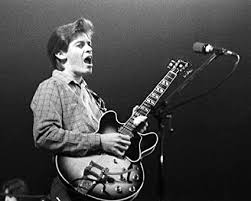 Do you think Be-Bop Deluxe should have received more recognition?
Do you think Be-Bop Deluxe should have received more recognition?
I never worried too much about that. I think we got the right degree of recognition without falling into the trap of becoming stereotyped by our own commercial success. In fact, the reason I wanted to end the band and form Red Noise was because Be Bop were starting to become institutionalised, too successful.
Were you frustrated when EMI refused to release the second Red Noise album, “Quit Dreaming and Get On the Beam” in 1979?
Well, it wasn’t a great time, though it wasn’t only me who was given the run around. EMI’s management had changed and they were only wanting to retain the massive sellers, the more mainstream acts. Bands like Red Noise were seen as too uncommercial or something. But, like many things, it turned out to be ok and I survived it and moved on to better things.
Were you surprised when Robert Wyatt asked for your autograph at John Peel’s wedding?
Of course! And I still chuckle about that…
Did you enjoy the amazing interview with Robert Wyatt for Musician magazine in 1992?
I have nothing but admiration and respect for Robert, he’s a great musician, a great artist, just wonderful. The interview we did together was very special to me and will always be remembered with great fondness.
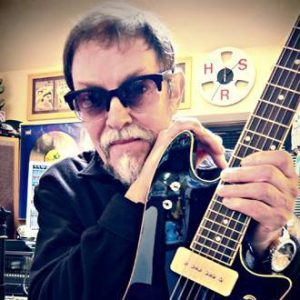 Why do you prefer studio albums more than concerts?
Why do you prefer studio albums more than concerts?
Well, as I said before, I don’t consider myself as a natural performer. I much prefer the studio, treating each piece of music like a painting, using the studio as the canvas. It’s become more like my natural home.
Do you still believe that nobody has gone much further than Jimi Hendrix?
Jimi was pretty hard to top. But whether people have gone “further” or not is open to debate, and probably not such an important thing to worry about. What Jimi did was transformational for the particular time he lived in, and that’s more than enough.
What is so special about Jean Cocteau?
That’s a question that needs a very long and detailed answer, too long and detailed to go into here. All I’ll say is that anyone who hasn’t read his work, seen his films and art, should investigate and prepare to be dazzled. For me, his work just sings in my soul.
Could you please tell us a few words about Terry Riley and Karlheinz Stockhausen’s influence on your music?
Not sure there is an ‘influence’, probably more of an inspiration. It’s many, many years since I’ve listened to either, but, certainly Riley’s “A Rainbow in Curved Air” was an album I listened to a lot when it first came out.
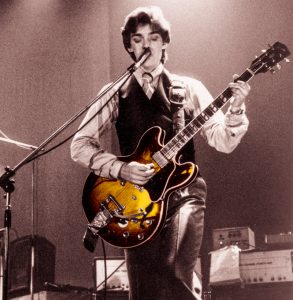 I know that the early Be-Bop Deluxe have been erroneously compared by some media to David Bowie. How did you feel when Andy Clark (keyboards) played on David Bowie’s “Scary Monsters” (1980) album?
I know that the early Be-Bop Deluxe have been erroneously compared by some media to David Bowie. How did you feel when Andy Clark (keyboards) played on David Bowie’s “Scary Monsters” (1980) album?
You know, the first line up of Be Bop Deluxe was very much influenced by Bowie. We started out as a glam band, just playing local pubs for fun. It was all light-hearted, not a serious thing. We had no idea of it becoming a professional band. But by the time we eventually were signed to EMI, I’d started to move on in terms of my writing and in fact was already working on some songs that would eventually become tracks on the “Futurama” album. However, EMI thought we should stick with the glam image as we’d built up a good following in our home area and fans would want to have the songs they knew put on an album. It was a start and I was happy enough to go along with it at the time, but there was more than that in my bag and I left that image behind as soon as possible. Unfortunately, journalists who haven’t kept pace with my work still make the old Bowie comparisons, which can be frustrating. Ironically, Bowie seems to have been a closet fan of my work, which was flattering to know.
Do you think punk rock had anything to do with music or it was just a marketing invention? (I believe the latter).
It was heavily marketed and a lot of hype was involved, but some of it was needed to blow the cobwebs from the music scene. Some of it was well-intentioned but not, to my ears, all that interesting, but it led to the post-punk era of bands like Wire and Magazine and PIL, all of whom I really liked. Each generation has its own scene, things move on, go around in circles, depart and return. It all adds to the colour of life’s rich tapestry. I always await further wonders…
A huge “THANK YOU” to Mr. Bill Nelson for his time. I should also thank Mr. Jon Wallinger for his valuable help.
Main photo credit: Martin Bostock
Bill Nelson official website: https://www.billnelson.com/
Bill Nelson official Facebook page: https://www.facebook.com/bill.nelson.54943600

